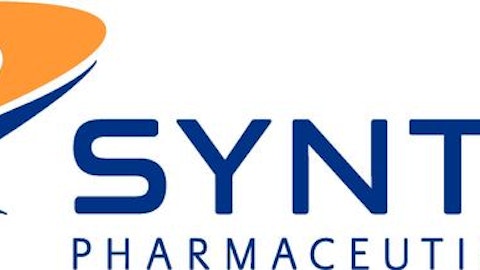John Gillard: Yeah. That would be from one algorithm. So that will just literally be from Kenya. So — and we are hopeful that we will be included as the screening test in the algorithm. That’s what all indications suggest and that’s what the task force recommended. And
Aris Kekedjian: The pilot is going well. So all indications are we are good to go with Kenya. And Kenya, as you know, sets the tone, and we have got commercial teams on the ground. We have got a whole team on the ground working all the other algorithms. But we really do believe that when we get Kenya landed, that it’s going to set the stage for the rest.
John Gillard: And that’s what has been indicated most of their annual demand, right, under their current plans. So, yeah, it’s not driven from our manufacturing capability. It’s driven from our expected demand. I mean on the basis we get the screening position.
Paul Nouri: And the legacy business that’s been declining for a number of years and was hit by the lockdowns in China, how large does that business remain now?
John Gillard: And it’s probably — it’s less than $2 million a quarter, right? What we are seeing with that, Paul, is just a continued tapering off, right? And I think, we — there’s some evidence of a little bit of a bounce back in that, yeah, around basically a higher level of pregnancy in China and a lot of our infectious disease test there is used for screening pregnant mothers. So, look, there will be variability within that number, but over time, that’s not an area that we are expecting to grow and that’s why we are moving to that portfolio effect in terms of our productive manufacturing capability.
Aris Kekedjian: Look, the key for us with respect to infectious disease is, as we are examining next-generation instrumentation around autoimmune, especially around a chemiluminescence type technology platform, we believe that has significant synergy and alignment and potentially rejuvenates our infectious disease business. So we are looking at that as in tandem. We think that’s — we are going to do anything significant in terms of investment in infectious disease. It will be on the back of being smart about what we do with autoimmune on a next-generation basis.
Paul Nouri: And the syphilis test that you guys had FDA approved and didn’t really sell much of whatever the factors were in the U.S. Is it completely pulled from the market and what are your plans for syphilis point-of-care moving forward?
John Gillard: We distributed the syphilis tests on behalf of a third-party and demand for that product is high. We continue to have ongoing discussions with that supplier in terms of our strategic plans. Look, we are inherently an infectious disease lateral flow developer and manufacturer, right? So there’s clearly an element of skill set. But we have to weigh that all versus the regulatory costs and development costs and challenges have gone after that market. So constantly under review, but at the moment, we are happy with the performance of the — from a revenue perspective of the third party product that we are distributing.
Paul Nouri: Okay. And I guess, probably, last question. How did the lab in Buffalo perform this quarter, and in particular, the Sjogren’s test?
John Gillard: Yeah. We have continued to see growth in Sjogren’s test. That’s typically growing quarter-on-quarter and
Aris Kekedjian: Yeah. I mean, Sjogren’s we are probably doing $3.5 or so million of revenue. We think — and that’s up — I mean if you look at it just from a couple of years, it was $2 million back in what 2000, was it 2020?
John Gillard: Yeah. I mean, yeah, a bit lower. Yeah.
Aris Kekedjian: So
John Gillard: Significant growth in that.
Aris Kekedjian: Significant and we haven’t really marketed it, to be honest with you, one of the opportunities that I have been focused on is where our — where do we have IP and what’s an interesting model going forward for our reference lab. And the beauty of the Sjogren’s product is that, we haven’t marketed it and it’s been growing significantly. If we put some work behind it, I think we can significantly scale that business and it’s all based on the fact that we had a partnership with the University of Buffalo, where we licensed key markers into a test. I think that’s a model for us going forward, where we can license promising biomarkers around the autoimmune space and develop those into tests that only we can provide. So between that and partnerships with pharmaceutical companies in the autoimmune space, that’s kind of where we are leaning with a broader strategy
John Gillard: And the lab, generally, Paul, I think, we have set out at the Piper conference, Aris spoke about it and we are very, very focused on increasing the capabilities of that lab. We have a huge amount of infrastructure there. We have a great asset, having a New York Certified lab. We think that really plays well in terms of the at-home testing market that’s kind of opened up post-COVID. So a big strategic focus for us is finding the right partner that can help us scale that business in a way that delivers real value to Trinity in a way that’s sticky and recurring rather than a kind of merely transactional relationship that we can lose value over time. So that’s our strategy around that.
Aris Kekedjian: I mean, if you look our plan has real growth in the lab over the next several years, because we have visibility to both improving the specialized nature of what it does today around the kind of things that are growing like autoimmune disease. And at the same time, we believe we have the capability of capacity to build it out to meet the needs of the B2B2C market. And it’s something I discussed last week at Piper and I really believe we are sitting on a valuable asset there.
Paul Nouri: Right. Well, thanks for answering my questions.
Aris Kekedjian: Thanks, Raul.
Operator: The next question is from Andrew May of Wells Fargo. Please go ahead. Andrew is your line muted?
Aris Kekedjian: Kate, why don’t you move on.




